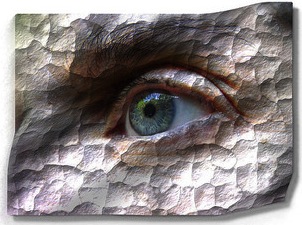How Bulletproof Coffee Helps Low Carb Paleo Dry Eyes

Just about any coffee can stop dry eyes in two ways:
1. Bad coffee tastes bad and has toxins in it, which makes you sad, which makes you cry. Problem solved!
2. The caffeine in coffee acts on certain chemical receptors in your brain, which facilitates the release of tears.
Both of these observations are supported by research. The first theory is supported by the fact that I’ve never had street-grade coffee that didn’t leave me in tears, cursing that I spent $4 on something that tastes that burnt. The second way coffee stops dry eyes is supported by a new study that was just published in the journal Ophthalmology.
Keratoconjunctivitis sicca, also known as “dry eye syndrome,” is a disorder that usually happens to older people where there is a malfunction in the production and clearance of tears. It also happens to people on very low carb diets for long periods of time. For most people, it’s a minor inconvenience that requires some eye drops and blinking. For others, it can progress into a serious disease that results in loss of vision. This condition affects over 4 million people over the age of 50 in the U.S. A new study has shown that caffeine may be a solution.
Before getting into the study details, here is a little background: A previous study found that 13 percent of caffeine users had dry eye syndrome, while 17% of non-caffeine users had the condition. Previous studies had also shown that caffeine stimulates the production of saliva and gastric fluids (like stomach acid), so it seemed likely that it would also increase tear production.
In this new study, Japanese researchers divided 78 participants into two groups: One group received caffeine tablets in the first session, and a placebo in the second session. The other group received the same dosage, but they took the placebo first and caffeine second. The researchers measured the subject’s tear volume 45 minutes after they took the tablets. They also measured the subjects DNA to see how different genetic variations changed the subject’s response to caffeine. All of the subjects avoided caffeine for six days before the start of the study, were in good health, and didn’t have dry eye syndrome. This was to make sure the results of this study were relevant for other causes of non-medical dry eyes.
Every single person who took the caffeine tablets had more tear production than when they took the placebo. In addition, the researchers also found that the people with a certain genetic variation responded more to caffeine than others. The exact genes that caused this were not listed in the abstract, but I’m pretty sure they’re the same ones that 23andme uses to determine caffeine sensitivity.
While it may seem that the giant commodity coffee companies have a monopoly on helping you produce more tears, this study shows that caffeine in general can help increase tear production. However, it doesn’t pay to be lax when choosing your coffee. As you’ve read here before, not all coffee is created equal. If you choose a low-quality coffee, the negative effects of chronic exposure to coffee mold toxins on your health outweigh potential benefits you might get from increased tear production. This is why I recommend Upgraded Coffee Beans, which have been carefully engineered to reduce the mold toxins (and a few others) that are associated with many of coffee’s negative impacts.
Dry eyes are a common problem that many people think they have to “live with.” Whenever I hear a defeated statement like that, the biohacker in me looks for something others have missed.
Interestingly, dry eyes can especially be a problem for Paleo or Bulletproof practitioners. If you cut carbs too low for too long, you can start to get dry eyes because your body uses glucose to make tears and mucous. You can also get dry eyes from sleep deprivation or prolonged sleep hacking.
I ran into this after a few of my long trips when I was experimenting with very low carb intake in a poorly-designed self experiment to see how I fared on a diet as close to Eskimo level of carbs as possible. I got severely dry eyes when I ate only one serving of vegies per day, with no other carbs. Bulletproof Coffee helped.
Now, on the Bulletproof Diet, which is low, but not ultra-low carb, dry eyes are much less of a problem, especially as this study shows, with Bulletproof Coffee. An additional reason you can benefit from the butter in Bulletproof Coffee is the the fact that the crystalline lens membrane requires high cholesterol for proper epithelial cell development and lens transparency,” writes Dr Carolyn Machan. Cholesterol in the butter may help with proper development of membranes and lens transparency in your eyes.
Have you ever had problems with dry eyes? Did the Bulletproof Diet or Bulletproof Coffee help?



